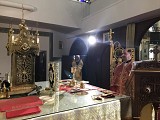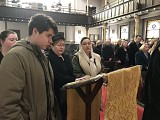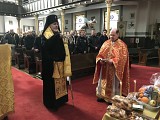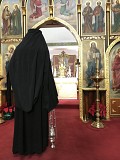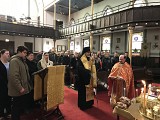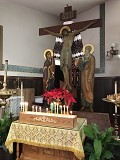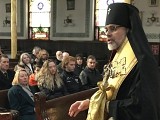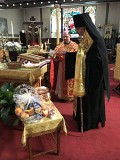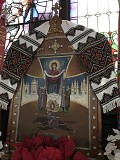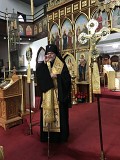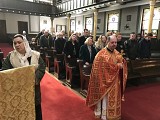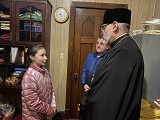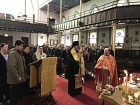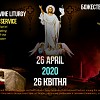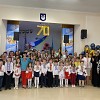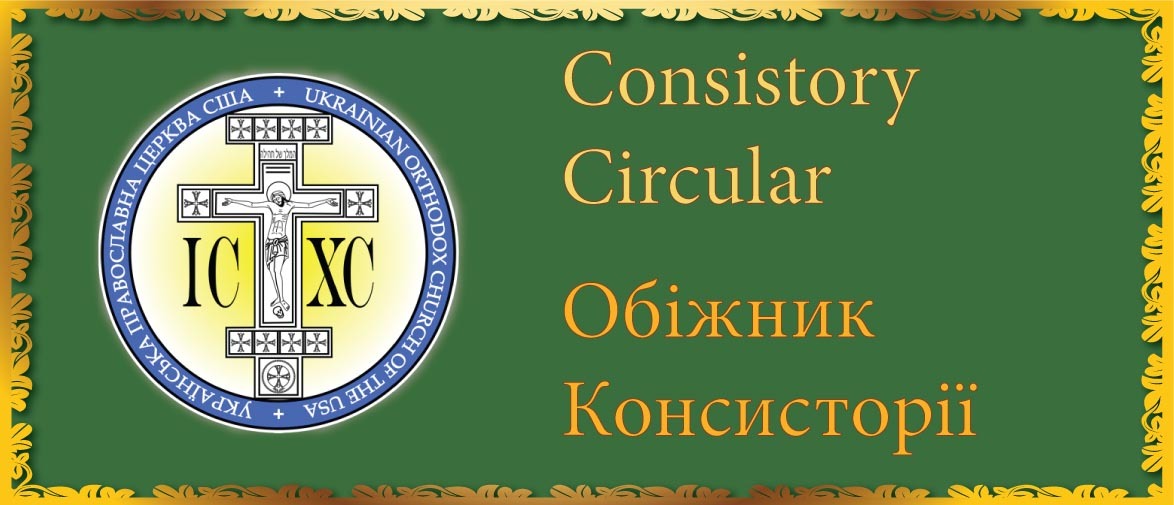On Saturday before Meat-fare Sunday, the calendar of the Holy Orthodox Church commemorates of all those who, from ages past, have piously fallen asleep, in the hope of resurrection unto life eternal.
His Eminence Archbishop Daniel, while on his archpastoral visit to St. Volodymyr Ukrainian Orthodox Cathedral in Chicago, Il presided over the liturgical service of the Saturday of Souls at the main cathedral of the Western Eparchy of the Ukrainian Orthodox Church of the USA.
Very Rev. Fr. Ivan Lymar served the Eucharistic Divine Liturgy, during which the hierarch and numerous faithful of the community partook in the Holy Mystery of Eucharist.
Following the conclusion of the Liturgy, Archbishop Daniel served Memorial Service for all reposed from ages past, especially the victims of the Revolution of Dignity in Ukraine – the Heavenly Hundred, whose memory was honored on February 20th, as the 6th anniversary of the tragic slaughter of innocent young men and women took place on the main street of Kyiv, Ukraine.
Archbishop Daniel also offered prayers for the reposed clergy (hierarchs, priests and deacons) of the Church; faithful Orthodox Christians who reposed in the Lord, victims of the Terrorist Attack of 9/11; victims of Chornobyl Nuclear Disaster; Ukrainian Genocidal Famine of 1932-1933; men and women of the Armed Forces of the United States of America and Ukraine that offered their lives in the service of their nations; victims of abortion and the most recent victims of Corona virus that lives of thousands of people throughout the planet.
In his remarks, following the Memorial service, Vladyka Daniel spoke of the importance to pray for the deceased loved ones and the deep history of the Holy Orthodox Church – Ukrainian Orthodox Church of the USA – to pray for all those who, from ages past, have piously fallen asleep, in the hope of resurrection unto life eternal.
Archbishop stated: “At every Divine Service, the Holy Orthodox Church offers up prayers for her departed children. Special prayers and Troparia are read at Compline (Night Service) and Midnight Service, and at Vespers and Matins the departed are remembered in the Litany of Fervent Supplication. At the Divine Liturgy the departed are commemorated at the Proskomedia, in the Litany following the Gospel and when It is truly meet... is sung. In addition, it is customary to have a Service for the departed on Saturdays, unless this coincides with a feast on that day.
The Third Day.
On the third day after death, it is customary to commemorate the departed, since they had been baptized in the Name of the Holy Trinity-Father, Son and Holy Spirit and had kept the Orthodox Faith they received at Holy Baptism. In addition, as the Apostolic Constitutions point out: Let the third day of the departed be celebrated with psalms and lessons, and prayers, on account of Him Who arose within the space of three days (Bk. 8, Ch. 42], that is, in honor of the Third-Day Resurrection of our Lord Jesus Christ.
The Ninth Day.
On the ninth day after death, the Orthodox Church offers prayers for the departed both in remembrance of the living [Apost. Const.} and that the departed soul be counted worthy to be numbered among the choir of the saints, through the prayers and intercessions of the nine ranks of angels.
The Fortieth Day.
From earliest times the Church had commanded that the departed be commemorated during the course of forty days and on the fortieth day itself, for so did the people lament Moses after his death [Apost. Const.]. This is also done in remembrance of the victory of Christ over Satan after He had spent forty days in fasting and prayer. The Church also commemorates the departed on the yearly anniversary of death and, in some places, on the twentieth day, and the third, sixth and ninth months, as well. It is also customary to commemorate the departed on their birthdays and patronal saint's days.
Koliva (grain or rice, cooked with honey or sugar, sometimes mixed with plums, raisins and other sweets) is often offered on these days of commemoration. The grain and fruit signify that the dead will again rise from the grave by God's might, for both the grain (sown in the ground) and the fruit (which falls on the ground) decay first and then afterwards bring forth abundant, ripe and whole fruit. Sugar and honey signify that after the Resurrection of the righteous, there will come a joyful and blessed life n the Kingdom of Heaven, rather than one bitter and sorrowful.
As St. Simeon of Thessalonica says:
"The [Third Day Service] is celebrated for the reason that [the departed one] received his being through the Trinity and having passed to a state of good being and being changed he shall [at the Resurrection] appear in his original state or one superior. The [Ninth Day] is celebrated that his spirit dwell together with the holy spirits the angels being immaterial and naturally similar to them for these spirits are nine in number and by them [the orders] they triply proclaim and praise the God in Trinity and so that he may be united with the holy spirits of the Saints. The [Fortieth Day] is celebrated because of the Savior's Ascension which came to pass after so many days after His Resurrection in the sense that [the reposed], as it were, having also risen and having ascended...being caught away in the clouds, shall meet the Judge and thus being united with Him, he should ever be with the Lord (1 Thess. 4:17)."
Now the third, sixth and ninth months are also celebrated as proclaiming the Trinity, the God of all, and to His glory in behalf of the deceased, for by the Trinity a man is fashioned, and when loosed from the body he returns to Him, and by the Trinity he hopes to receive resurrection. But the end of the year is celebrated because it is the consummation, and our God, the Trinity, is the Life of all and the Cause of being, and shall be the Restoration of all and the Renewal of human nature.
In general, the custom of observing prayers for the dead has been held by the Orthodox Church since earliest times. The Divine Liturgy has always been celebrated in memory of the departed and, on these days, many have increased and continue to increase their offerings in the Church, assisting the poor and needy brethren out of love for their departed loved ones.
In addition to these personal days for remembrance of the departed, the Church has also set aside a number of universal days of commemoration. These are:
Meatfare Sunday.
This Saturday falls during Meatfare Week, which is the last week for eating meat before the start of the Great Fast. On the following day, Meatfare Sunday, the Church commemorates the Dread Judgment of Christ, and for this reason, on the Saturday before she prays for all who have departed in faith and hope of Resurrection, that Christ show mercy to them at the Universal Judgment. This commemoration dates from very ancient times and here the Church especially prays for those who have met untimely deaths and have been left without a proper funeral. This is evident from the hymns of that day, including the following from the Matins Canon:
Second, Third and Fourth Saturdays of Great Lent.
Since the usual Divine Liturgy of St. John Chrysostom is not celebrated on the weekdays of Great Lent, but rather the Liturgy of the Presanctified Gifts, it is the accepted custom of the Church to commemorate the dead on these three Saturdays (the other Saturdays being dedicated to special celebrations: St. Theodore on the 1st Saturday, the Akathist to the Theotokos on the 5th, and the Resurrection of Lazarus on the 6th), so that the dead not be deprived of the Church's saving intercession.
Tuesday of St. Thomas Week.
According to pious custom, a commemoration of the dead is made so that, having celebrated the bright festival of Christ's Resurrection, the joy of the Paschal feast be shared with those that have departed in the hope of their own Resurrection. Thus this day bears the name, Day of Rejoicing.
Trinity Saturday.
On this day (the Saturday before Holy Pentecost) the Church asks that the saving grace of the Holy Spirit wash away the sins from the souls of all our forefathers, fathers and brethren that have reposed from all the ages, asking that they all be united in the Kingdom of Heaven.”
At the end of the service traditional Kolyvo was blessed and distributed among the faithful.
|
| |||||||||||||
